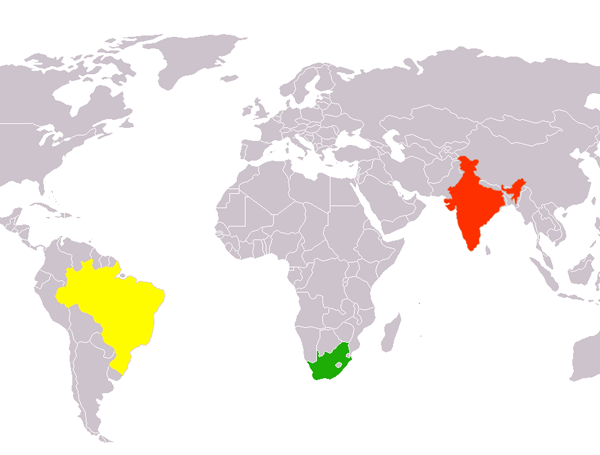International Relations
IBSA and Digital Governance Reform
- 11 Mar 2023
- 5 min read
For Prelims: IBSA Forum, United Nations (UN) Office for South-South Cooperation (UNOSSC), India’s Aadhaar biometric ID system, India’s G-20 presidency.
For Mains: Major Issues Related to Global Digital Governance, Initiatives of IBSA Grouping.
Why in News?
According to the Geneva-based DiploFoundation, India, Brazil, and South Africa, which have together formed the tripartite IBSA Forum, may play a prominent role in the process of reforming digital governance.
What is IBSA?
- About:
- The IBSA is a trilateral, developmental initiative between India, Brazil and South Africa to promote South-South cooperation and exchange.
- Formation:
- The grouping was formalised and named the IBSA Dialogue Forum when the Foreign Ministers of the three countries met in Brasilia (Brazil) on 6th June 2003 and issued the Brasilia Declaration.
- Collaboration:
- Joint Naval Exercise:
- IBSAMAR (IBSA Maritime Exercise) is an important part of IBSA trilateral defence cooperation.
- IBSA Fund:
- Established in 2004, IBSA Fund (India, Brazil and South Africa Facility for Poverty and Hunger Alleviation) is a unique Fund through which development projects are executed with IBSA funding in fellow developing countries.
- The fund is managed by the United Nations (UN) Office for South-South Cooperation (UNOSSC).
- Joint Naval Exercise:
How can IBSA Contribute to Global Digital Governance?
- Potential of IBSA:
- Digital inclusion:
- Digitalisation is driving growth in the IBSA economies.
- The three countries have spearheaded digital inclusion by prioritising affordable access to citizens, supporting training for digital skills, and creating a legal framework for the growth of small digital enterprises. India leads the way, with a vibrant digital economy.
- Data Governance:
- India’s G-20 presidency aims to take strategic leadership with practical initiatives, such as a self-evaluation of nations’ data governance architecture, modernisation of national data systems to regularly incorporate citizen voices and preferences, and transparency principles for governing data.
- With a big population, IBSA countries also see data as a national resource.
- Digital inclusion:
- Issues:
- Geopolitical Rivalry:
- Satellite collisions, cyber-resilience and security of space services, exploration of space resources has increased competition between countries with a potential of weaponization of outer space.
- Also, semiconductors are at the centre of the geopolitical battle between the US and China.
- Satellite collisions, cyber-resilience and security of space services, exploration of space resources has increased competition between countries with a potential of weaponization of outer space.
- Sovereignty vs Integration:
- The Foundation observes that many countries will have to balance data sovereignty and integration in the global economy.
- Free flow of data will be essential for small and export-oriented economies.
- Geopolitical Rivalry:
What is India's Progress in Digital Governance?
- Aadhar: India’s Aadhaar biometric ID system is seen by many as a leading digital identity initiative, inspiring similar systems in other countries.
- MyGov Platform: It has laid the robust foundation for citizen engagement and participatory governance in the country by providing a common digital platform, where citizens can share their views on government programmes and schemes.
- Unified Payments Interface (UPI): Launched in 2016, UPI is a real-time payment system that enables instant money transfers between bank accounts using a mobile device.
- UPI has transformed the way payments are made in India, making it faster, more convenient, and more secure. UPI's success has inspired other countries to tie up with India and adopt similar payment systems.
- Digital India Act: Government of India has proposed to come up with Digital India Act 2023 that envisages to act as catalysts for Indian economy by enabling more innovation, more startups, and at the same time protecting the citizens of India in terms of safety, trust, and accountability.
Way Forward
- Collaborate with Other Countries & Organizations: IBSA countries should work together and with other nations and international organizations to develop global standards for digital governance, data protection, and cybersecurity.
- Develop a Common Strategy: IBSA countries should develop a common strategy on digital governance and work towards a shared vision of a global digital economy that prioritizes digital inclusion, data privacy, and security.
- This strategy should be based on their shared values and principles, such as respect for human rights, democracy, and the rule of law.





